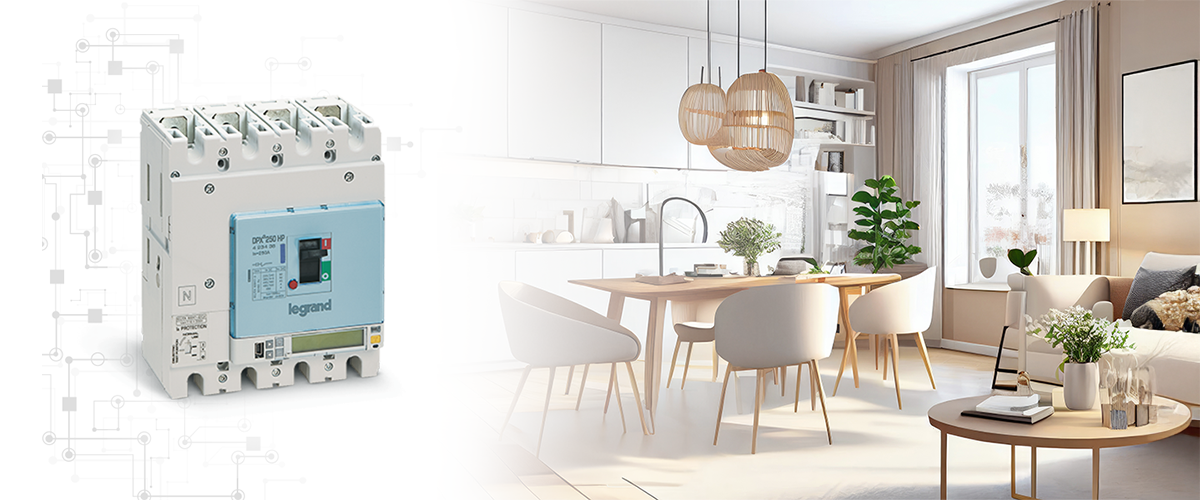



Containment systems with integrated cooling mechanisms to regulate temperature

Range of accessories to enrich your living environment with enhanced IoT - based user
Picture a typical Indian summer – air conditioners humming, refrigerators overstocked, washing machines in full swing. Then suddenly, the power goes out. Not due to a power cut, but because of an overloaded circuit that wasn’t properly protected. In such moments, electrical reliability becomes a necessity, not a luxury. This is where MCCBs (Moulded Case Circuit Breakers) play a critical role.

So, what exactly is an MCCB, and why does it matter?
In simple terms, it’s an electrical protection device designed to prevent hazards like overloads and short circuits. Unlike the smaller MCBs used in residential setups, MCCBs are built to handle higher current loads and ensure robust protection for both residential and industrial environments. Trusted names like Legrand are at the forefront of MCCB innovation, offering solutions that balance safety, adaptability, and durability.
What Is an MCCB and How Is It Different from an MCB?
A Moulded Case Circuit Breaker (MCCB) is engineered to manage large electrical loads, typically from 100A to 2,500A. It’s ideal for protecting circuits in commercial buildings, industrial machinery, and critical infrastructure.
In contrast, Miniature Circuit Breakers (MCBs) are limited to lower current capacities, usually below 125A. They are suitable for low fault-level environments, mainly in final distribution circuits.
Key differences include:
Current Capacity: MCCBs support much higher load thresholds.
Adjustable Trip Settings: MCCBs offer customizable protection for overloads and short circuits.
Application: MCCBs are preferred in demanding environments like factories, commercial hubs, and data centres.
How Do MCCBs Work? Understanding Their Trip Mechanisms
If MCBs are like security guards for basic threats, MCCBs are special forces more adaptive, powerful, and precise. Their core job is to detect abnormal current flow and “trip” to cut the circuit, preventing equipment damage or fire hazards.
MCCBs offer three distinct trip mechanisms:
Thermal and Magnetic Trip Units
Electronic Trip Units
Each type serves a specific protection role based on the environment and application.
1. Thermal Trip Units: Handling Overloads with Precision
Thermal trip units operate using a bimetallic strip that bends when exposed to sustained overcurrents. This action triggers the breaker to trip.
Use Case: Gradual overloads due to prolonged appliance use.
Ideal Environments: Residential settings, small commercial spaces.
Key Feature: Time-delayed response—tolerates harmless current spikes (e.g., motor startups) while guarding against sustained overloads.
This mechanism offers reliable protection for everyday scenarios where power usage fluctuates but doesn’t spike drastically.
2. Magnetic Trip Units: Fast-Acting Protection Against Short Circuits
Magnetic trip mechanisms use an electromagnetic coil that reacts instantaneously to short-circuit conditions. When a massive current surge occurs, the magnetic field forces the breaker to trip almost immediately.
Use Case: Instant protection from short circuits.
Best Suited For: Industrial machinery, motor control panels, and transformer lines.
Advantage: Extremely fast response time to avoid catastrophic damage.
Legrand’s MCCBs feature precisely calibrated magnetic trip units, ensuring quick action where milliseconds count, especially in critical load applications.
3. Electronic Trip Units: Smart Protection for Complex Systems
Electronic trip units use microprocessor-based control to detect and respond to electrical anomalies with unparalleled accuracy. These are the most sophisticated among all MCCB types.
Benefits:
Programmable trip settings for both overload and short-circuit protection.
Enhanced fault detection and diagnostics.
Event logging and communication capabilities.
Ideal For: Data centres, healthcare facilities, industrial automation systems, and modern commercial buildings.
With Legrand’s advanced electronic MCCBs, users gain intelligent protection, remote diagnostics, and the ability to fine-tune settings based on real-world operating conditions.
Why Choosing the Right MCCB Trip Unit Matters
Selecting the correct trip mechanism isn’t just a technical detail—it directly impacts safety, uptime, and operational efficiency. The right MCCB will:
Prevent electrical fires by isolating faults quickly.
Protect sensitive electronics and motors from current spikes.
Reduce downtime by avoiding unnecessary trips and ensuring consistent performance.
Example:
A bakery with industrial ovens and chillers would benefit from magnetic trip protection.
A tech company managing sensitive server rooms would need the precision of electronic trip units.
Do MCCBs Outlast MCBs?
Yes. MCCBs are built to endure. Unlike MCBs that may degrade after frequent tripping, MCCBs are designed for high-stress applications and offer a longer mechanical and electrical lifespan.
Legrand’s MCCBs are tested for durability under extreme conditions, frequent switching, high temperatures, and intense load cycles. They’re an ideal long-term investment for both safety and operational continuity.
Final Thoughts: Why Legrand Is a Trusted Name in MCCBs
In today’s high-demand environments, electrical safety cannot be compromised. That’s why Legrand continues to set the benchmark in MCCB technology, offering thermal, magnetic, and electronic trip units designed for India’s unique infrastructure challenges.
Choosing the right MCCB isn’t just about current ratings, it’s about finding the right match for your application, ensuring precision protection, and securing long-term reliability. Whether you’re protecting your home, commercial setup, or industrial system, Legrand’s MCCBs provide peace of mind through engineering excellence.
Ground Floor, Plot No. 603, Khata No. 457, Beside Pinak Traders, Gutuwa, Ranchi
B-1703, The Capital, Opp. Hetarth Party Plot, Science City Road, Sola, 380060
6-3-5953, Plot No-03, Narayan Nivas, Padmavathi Nagar, Erramanzil Colony, Khairtabad, Hyderabad
Isha House, Plot No-13, Electronic Co-Op Estate Ltd., Sr. No-4, Pune-Satara Road, Parvati, Pune
New India Cables Trading Pvt. Ltd 5 B,ganesh Road Near Kasba Ganpati Temple Pune - 411011
New India Cables Trading Pvt. Ltd., 5B, Ganesh Road, Near Kasba Ganpati Temple, Pune - 411011
D.no - 49-52-116, 1st Floor, Adushatowers, Opp Incometax Office, Shantipuram,
Merril Industrial Complex Pojoynagar, Near Dhulagarh Toll Tax, Ps Sandhipur Sankrail, Howrah
Shop No. 1, Opp. Super State Colony, New Purena, Mahaveer Nagar, Raipur, Chhattisgarh
64, Jay Amarnath Co-Operative Housing Society Ltd., Near Skill Diamond Skill Mill, Nikol Gam Road
1, Mall Godam Road, Shop No 21, Vashundhara Complex, Near New Shiyaganj, Indore
7-670-1, Near Gandhi Nagar, 10th Lane, Mangamoor, Donka, Ongole, Andhra Pradesh 523002
Ground Floor,plot No-603, Khata No 457, Beside Pinak Traders Gutuwa, Ranchi

